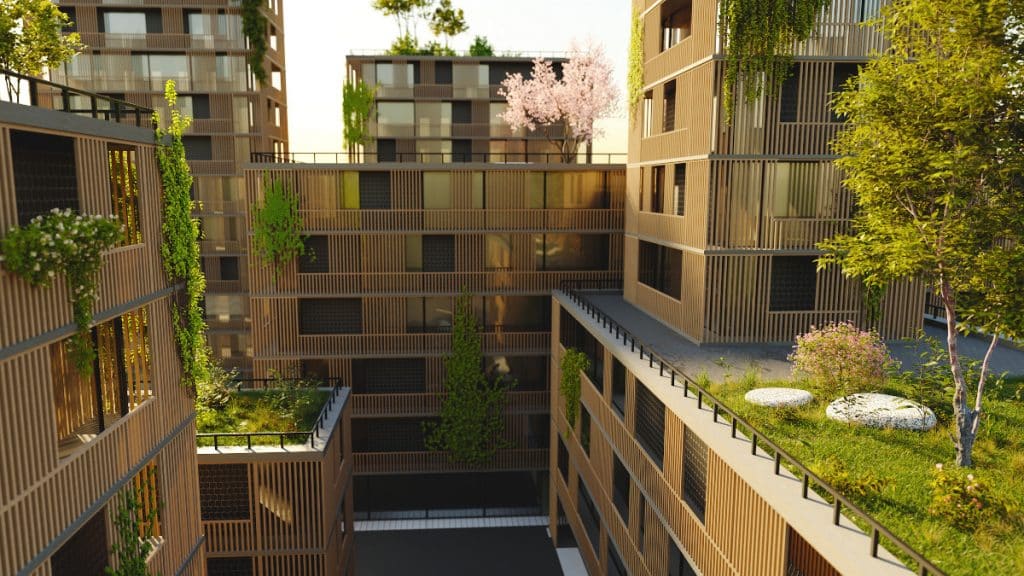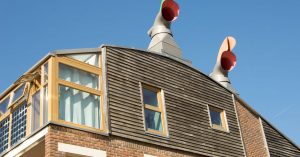/ Ecosystem engineers /

The still recent Urban Ecological Engineering course has been in existence for around ten years, and applies the principles of scientific ecology through the work of ecological engineers.
The profession is just as recent in the real estate sector, where artificialisation is the leading factor in the collapse of biodiversity.
Our ecologists work with urban project developers to raise awareness of the importance of biodiversity in their projects and of respecting ecosystem services for climate resilience.
These natural services to mankind depend on the proper functioning of the habitats created, beyond the plants themselves. They contribute, for example, to air quality and rainwater management.
Urban Ecological Engineering thus aims to reconcile nature and the city in a functional way that goes beyond mere aesthetic considerations: by controlling the resilience parameters of ecosystems. The benefits are as much for nature as for humanity, of which it is a part.
At the scale of the building block, our ecologists are interested in the constitution of the soil, the plant composition, and the reception of the surrounding fauna in exterior spaces, including the built envelope.
Combating heat islands, desiltation, desartificialization... To carry out these tasks of restoring natural environments or even urban renaturation, Urban Ecological Engineering calls on ecologist engineers, specialists in ecosystems.
/Integrating life into real estate /
They call on a wide range of skills.
They must :
- environmental diagnostics,
- conduct site compliance studies in line with current regulations,
- advise and train stakeholders,
- help site owners gain accreditation from various biodiversity labels (BiodiverCity, Effinature, BREEAM and HQE, which include biodiversity as a criterion),
- project management and execution.
In addition to carrying out studies, they also work as design ecologists on ecological engineering projects. They play a key role at a time when new legislation is encouraging investors to be ever more responsible.
The French Climate and Energy Act reinforces their transparency obligations, particularly with regard to biodiversity.
The criteria used by the European taxonomy to determine whether a building is sustainable are constantly evolving.
But while investors need to know precisely what impact their assets are having on the collapse of biodiversity, there is no single indicator of biodiversity, since the ecosystem is multifactorial.
For each case, therefore, a tailor-made grid must be created. It's as much a question of measuring the ecological value of the existing site and the potential for improving the ecological capacity, quality and functionality of each habitat preserved or to be created, as of the nuisances that degrade these factors.
These are calculated, for example
- evapotranspiration,
- light pollution,
- rainwater runoff,
- species abundance, etc.

Ecologists therefore also have a role to play in advising on asset strategy, in order to evaluate portfolios of real estate assets according to the issues, impacts and dependencies of the buildings and their activities on biodiversity.
The ultimate goal is
- restoring ecological functions degraded by human activities,
- good resource management and
- the sustainability of ecosystems in the face of climate change.
/Sinteo expertise /
Our ecological engineers support projects from the design stage through to construction and operation. Upstream, they examine the ecological context of the site, consider the challenges of the existing flora and fauna, and consider the uses to be made of the site, the impact they will have on biodiversity, the level of awareness among stakeholders and the regulations in force.
During the construction phase, they advise and coordinate contractors, ensure the protection of sensitive site features and seek to reduce the impact of the work.
Finally, they ensure that the desired results are achieved and that biodiversity is preserved over the long term, by monitoring renaturation indicators during operation and biodiversity monitoring.
Our ecologists are active within the Union Professionnelle du Génie Ecologique (UPGE), working to structure the sector in the real estate / building and public works sector and anticipating future standards and regulations.

Commissioning for real energy performance
Commissioning is a process focused on anticipating quality for the benefit of operations. It is a management tool designed to achieve real energy savings while reducing building operating costs.

